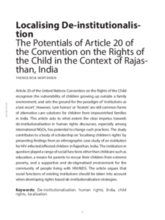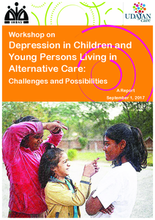childrens_living_arrangement
children_living_without_bio
Displaying 271 - 280 of 427
This article presents the findings of the Questionnaire to Assess Needs of Children in Care (QANCC), a tool designed to gather children's direct input on the management of Udayan Care's care homes in India.
This article from the Scottish Journal of Residential Child Care describes the Family Based Care (FBC) program by SOS Children's Villages of India.
This study contributes to a body of scholarship on ‘localising children’s rights’ by presenting findings from an ethnographic case study of an institution for HIV-infected/affected children in Rajasthan, India.
A children's home in Hyderabad, India has been forcing its residents to beg on the streets, according to this article from the Deccan Chronicle.
Kailash Satyarthi Children's Foundation has launched an online interactive game simulating the experience of child trafficking in India to raise awareness around the issue, according to the article.
This article from the Hindu describes the current debate between a faction of child rights advocates and the Child Welfare Committee (CWC) regarding the care and placement of a group of 16 trafficked children who were illegally sold into adoption in the Mysuru district in Karnataka, India.
At a recent review meeting of the Child Welfare Committee (CWC) in the Kamrup Metropolitan district of India, the Kamrup Deputy Commissioner Dr M Angamuthu ordered all childcare institutes (CCI)s in the district to legally register themselves under the Juvenile Justice Act 2015 and Rules, or face legal action, according to the article.
The purpose of this study was to assess the impact of care at foster homes on the health-related quality of life (HRQOL) of children living with HIV (CLHIV), attending a referral ART Centre, and to compare their HRQOL with children living in their own homes.
This document provides a full report of the workshop on “Depression in Children and Young Persons living in Alternative Care: Challenges and Possibilities.”
Indian adoptees living all over the world search for their biological families and discover they were trafficked into orphanages and adopted by families overseas, often unbeknownst to their biological parents.


